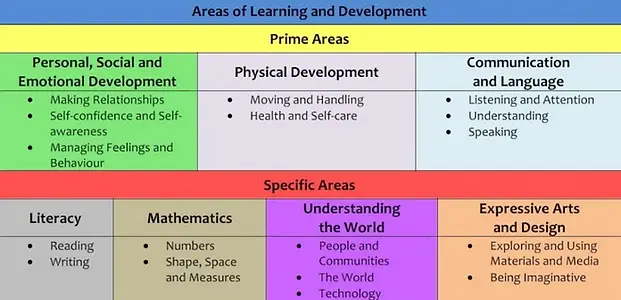
''Learning is not a race for information,
it's a walk of discovery.''
Curriculum
The Early Years Foundation Stages - Statutory Framework
The Early Years Foundation Stage (EYFS) sets standards for the learning, development and care of children from birth to 5 years old. All schools and Ofsted-registered early years providers must follow the EYFS, including childminders, preschools, nurseries and school reception classes. The Early Years Foundation Stage (EYFS) framework supports an integrated approach to early learning and care. It gives all professionals a set of common principles and commitments to deliver quality early education and childcare experiences to all children. As well as being the core document for all professionals working in the foundation years, the EYFS framework gives mums and dads confidence that regardless of where they choose for their child’s early education, they can be assured that the same statutory commitments and principles will underpin their child’s learning and development experience.
Key Workers, 2 Year Checks and 6 Week Settle Period
Children thrive from a base of loving and secure relationships. This is normally provided by a child’s parents but it can also be provided by a key person. A key person is a named member of staff with responsibilities for a small group of children who helps those children in the group feel safe and cared for. The role is an important one and an approach set out in the EYFS, It involves the key person in responding sensitively to children’s feelings and behaviors and meeting emotional needs by giving reassurance. The key person is a familiar figure who is accessible and available as a point of contact for parents and one who builds relationships with the child and parents or carers.
Records of developments (observations) are created and shared by the key person to parents and versa vica through our online Tapestry program, with everyone all working together creating the best outcomes for their child. All this information helps and supports the key person to tune into each child's play and their conversations so they can really get to know each child. Children feel settled and happy and are more confident to explore and as a result become more capable learners.
Every child is observed for a full 6 weeks before any observations are recorded, this is a perfect opportunity for both key workers, practitioners and children to get to know one another and workout their starting points.
Children will receive a two year check document just before they are 3 years. This is a development snap shot and is usually passed onto the health visitor via each parent.
EYFS Foundation stages Framework
All Children between the ages of 2 and 5 years will be observed by their key worker using the development matters in the Early Years Foundation stage (EYFS). These areas are called 'Prime Areas' and 'Specific Areas', both areas have a number of aspects. Please see table below:
Prime Areas
Communication and Language.
Personal, Social, Emotional Development.
Physical Development.
Specific Areas
Literacy.
Mathematics.
Understanding the World.
Expressive Art and Design.
Significant observations and progress will be recorded in your child's Tapestry account. This Information along with keyworkers and parents/carers knowledge about each child will support the child's development. This gives us a greater sense of how your child is progressing and if early intervention or if there are any special educational needs ie. Speech and language therapy etc.



